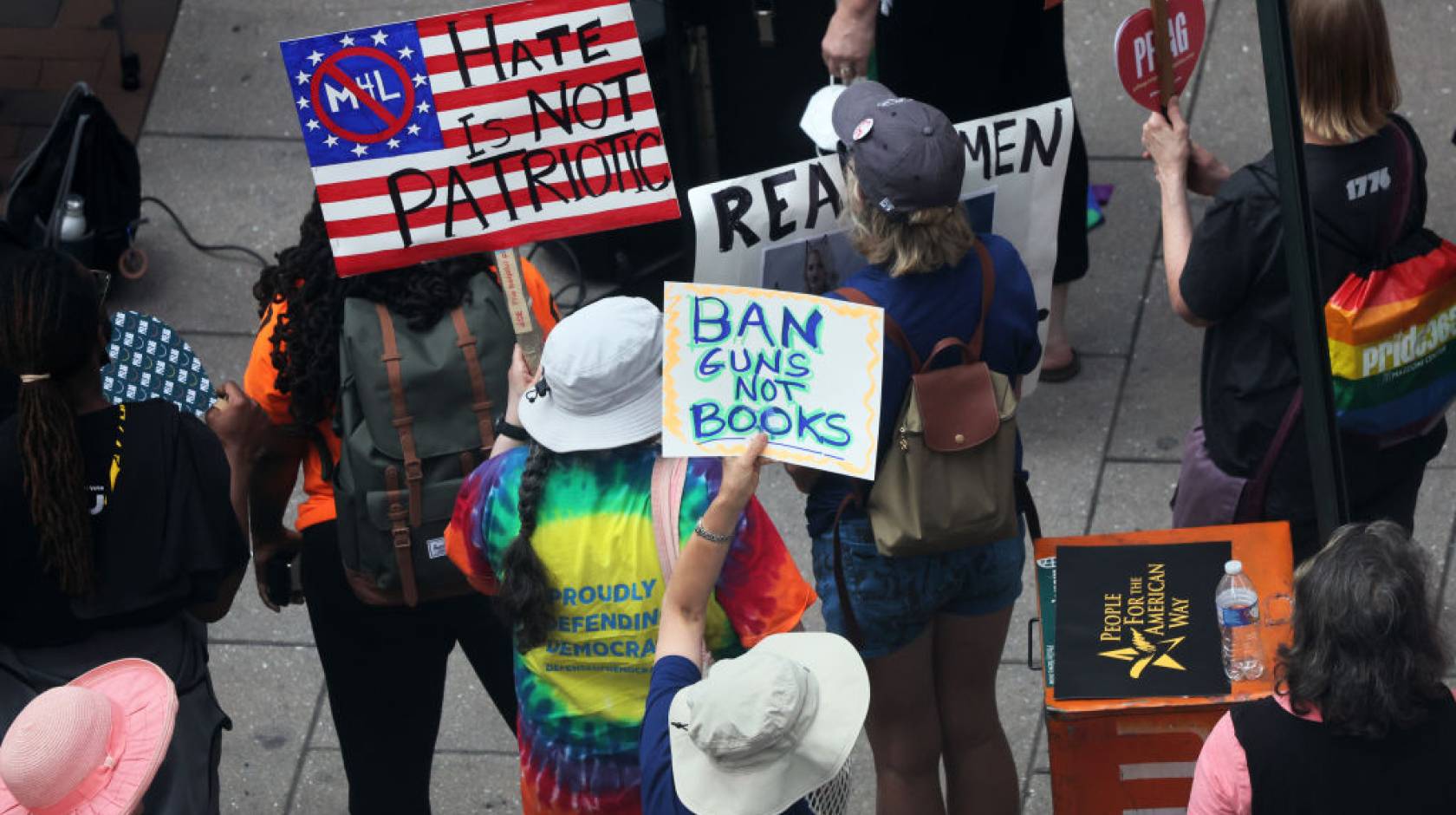David Danelski, UC Riverside

Two-thirds of nearly 500 U.S. school superintendents surveyed described moderate to high levels of culturally divisive conflict in their school district over race, LGBTQ+ student rights, and book access that is disrupting education and costing U.S. schools billions of dollars, according to a report released Wednesday by academics at four universities.
In the first-of-its-kind analysis, researchers at UC Riverside, UCLA, University of Texas at Austin, and American University estimated the financial costs incurred by school districts responding to culturally divisive conflict to be approximately $3.2 billion during the 2023-24 school year for U.S. public K-12 schools.
The superintendents reported increased costs for additional security, communications, and legal work. They also detailed indirect costs for redeploying staff to address challenges such as dealing with misinformation or threats on social media, responding to news media inquiries about book bans, and addressing dramatic increases for public records requests. Increased staff turnover created by the conflicts also increased costs for employee recruitment and training.
On average, a school district serving 10,000 students and experiencing moderate levels of conflict spent nearly $500,000 annually, and those districts experiencing high levels of culturally divisive conflict spent an average of $812,000. If a district with a high level of conflict decreased to a low level of conflict, the district would save roughly $562,000.
The conflicts also impacted the well-being of superintendents. In the surveys and follow-up interviews, they described personal threats to themselves and their staff. Half of superintendents reported they experienced at least one instance of harassment in the 2023-24 school year. Ten percent received threats of violence and 11% experienced property vandalism.
School districts were also plagued by the spread of disinformation, baseless allegations, and personal harassment. In the words of one superintendent, “Our social media accounts were effectively bombed … full of messages of hate. My 60-plus-year-old administrative assistant was bombarded with phone calls to the point where she wanted to quit.”
Such conflict damages schools beyond finances, the researchers say.
“It’s important for the public and policymakers to be aware of ways culturally divisive conflicts are harming the schools our children attend,” said Joseph Kahne, a distinguished professor in UCR’s School of Education and co-author of the survey report. “These conflicts come with a very real cost.”
UCLA education professor John Rogers, the lead researcher for the survey, added: “This research makes clear that culturally divisive conflicts in the nation’s schools are generating fear, stress and anxiety that is disrupting school districts and taking a personal toll on the educators and staff members who work in them.
“Sadly, as superintendents have told us, the cost of these conflicts not only has a financial impact but is also eroding teaching and learning and undermining the trust between schools and the communities so essential to our democracy and civic life,” Rogers said.
Of the 467 superintendents responding to the survey, almost all experienced some sort of culturally divisive conflict during the 2023-2024 school year.
For the analysis, the researchers established a “conflict score” based on the level and frequency of conflicts experienced by superintendents, ranking schools with low, moderate, and high conflict. Thirty-eight percent of school districts experienced moderate levels of culturally divisive conflict. More than one-quarter (27.5%) reported experiencing high levels of conflict, with conflict occurring regularly across several issue areas, often accompanied by violent rhetoric or threats.
Such culturally divisive conflict appeared to impact superintendent turnover. Previous research has shown superintendent turnover has increased from 14% to 17% over the last four years. The survey found that among those superintendents who have sought out another position in the last year, 42% indicated their decision was related to school board conflict, stress, and politics.
Almost a third (29%) of superintendents also reported that teachers and other staff members left the district or the profession due to culturally divisive conflict. Superintendents in high conflict districts were most likely to report heightened levels of staff turnover.
Culturally divisive conflicts also undermined staff well-being and increased rates of staff absenteeism. Seventy-two percent of superintendents in moderate conflict districts and 94% of superintendents in high conflict districts said culturally divisive conflict negatively impacted staff stress and mental health. Thirty-five percent of superintendents in moderate conflict districts and more than two-thirds (69%) of superintendents in high conflict districts said such conflict had a negative effect on staff absenteeism. Some superintendents also said they experienced difficulties in the recruitment of new staff due to divisive conflict.
Responding to culturally divisive conflict and its impact comes with significant financial costs for individual school districts.
While the survey report highlights fiscal costs, the researchers underscored the broader educational and societal costs of culturally divisive conflict.
In interviews, multiple superintendents expressed concern over the impact on teaching and learning, saying that dealing with conflict has taken away time spent on school campuses and instructional teams to improve instruction. As one said, “I never met with them once last year. Not a single solitary time because I was so busy embroiled in all of this other mess.”
Others cited concerns about teachers, fearing community backlash, and avoiding teaching important curriculum.
“What we don’t talk about is how fearful everybody is,” said one superintendent. Said another, speaking of fierce community conflict over district policies toward transgender students, “all of a sudden, we found ourselves caught in the crosshairs of a societal war.”
Many of the superintendents said it is vital for educational leaders and the broader public to work to diminish the opportunities for people to disrupt, distract, and gain power in school board meetings and elsewhere.
The report, “The Costs of Conflict, The Fiscal Impact of Culturally Divisive Conflicts on Public Schools in the United States,” was published by the Institute for Education, Democracy and Access at the UCLA School of Education and Information Studies. In addition to Rogers and Kahne, Robert Shand at American University and Rachel S. White at the University of Texas at Austin are co-authors.
The superintendent surveys were conducted with K-12 public school districts in 46 states during in the summer of 2024. The researchers also conducted follow-up interviews with 42 superintendents in 12 states. The report is available on the UCLA IDEA website.

John Rogers and Joseph Kahne

